Hopefully you'll never need to job search in danger (unless that's part of the job) but these lessons will help you in any job search situation.
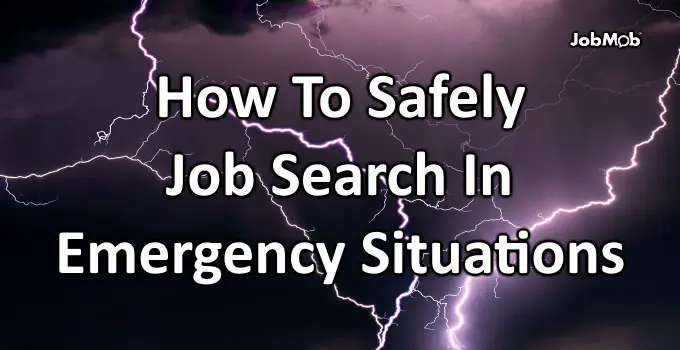
Have you ever had to look for a job in emergency conditions?
Extreme situations happen all the time and can affect anyone's job search no matter where you live, such as crazy weather, building fires or others.
For more than two decades, citizens in various parts of Israel have lived under the threat of terrorist rocket fire, and needed to rearrange their lives when it become more than a threat.
As a local resident for most of that time, I've had my share of tough moments on and off the job search. Fortunately, there were some good lessons to take away for any job search…
Note: There is a poll embedded within this post, please visit the site to participate in this post's poll.Summer 2006
Part I
In April 2006, my old company downsized my entire team of web developers and I. “Yippee,” I thought, “now we can go back to Israel.” My pregnant wife, 2 kids and I had been living in Paris (France) and after almost 4 years, it was time to leave.
May and June were spent learning how job search had changed in the past few years, creating a LinkedIn profile, updating and translating my resume into Hebrew.
Finally, towards the end of June, I started applying for jobs in Israel and quickly scheduled a week of interviews in mid-July.
On July 12th at around 6am, I landed in Israel after a night flight with a stopover in Prague. Not having slept much but having the whole morning to relax before a 2:30pm interview in Tel Aviv, I took a taxi straight from the airport to the beach and fell asleep… waking up in time to shower, change and grab a quick lunch before a taxi to Ramat Hachayal, the Tel Aviv neighborhood where many tech companies are based.
This was how my conversation started with the cab driver:
Me: “Nice day, isn't it?”
Driver: “What are you, crazy? Don't you know that a war is starting? Haven't you heard the news?”
Me: “Um, no. I was lounging on the beach all morning…”
While I was staring at the clouds, Hezbollah had fired rockets into northern Israel and attacked an IDF patrol near the Lebanon border, killing 3 soldiers and capturing 2 others. The army raced to respond and the Second Lebanon War began.
Over the next 9 days, I had 6 job interviews, all in the Tel Aviv – Herzliya area, far from where the rockets were falling in the North. Aside from small talk about the latest news from the front, I would never have otherwise known that a war was going on.
Part II
August 7th. Via a stopover in Budapest, I returned for a second visit to Israel and 7 more interviews, some of which were further north than last time but still not that close to the war zone where rockets were falling daily.
However, on August 13th, I got my first taste of rocket fire when I visited family friends in Haifa during Hezbollah's final barrage before the ceasefire went into effect the next morning.
I saw the full range of reactions to the air raid sirens and bombardment- people who kept driving as if the sirens weren't blaring, people who calmly but quickly took cover according to IDF guidelines, people who panicked and burst into tears regardless of whether they were exposed outdoors or safe in a bomb shelter. And all throughout, people calling or sending text messages to relay where a rocket (almost) landed and that they were ok.
Some businesses were open and some were closed, so if I had had any job interviews in the area, I would have had to call ahead to confirm on the day of the meeting. If the hiring company was open, would asking to reschedule to a quieter time have been ok? Probably, since no one thought the war would go on for months on end, but showing solidarity is a great way to stand out.
Fall 2012
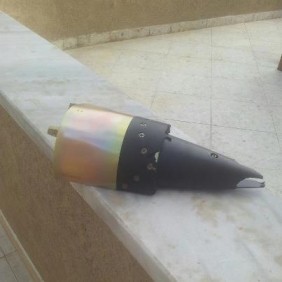
The rockets from the North a thing of the past – hopefully for good – now it's the South that was getting hit.
Operation Pillar of Defense started on November 14th with the goal of finally putting an end to the rocket fire from Gaza that had sadly become the norm for years (4 years here in Ashdod, almost 12 years for people in Sderot, near the border).
One big change is that since the previous year, the Iron Dome defense system had been in place to destroy incoming rockets. Back then, it had a success rate well over %80, but even when it did the job, burning rocket pieces can still hurt people and cause damage where they fall, like when a chunk of warhead (pictured) landed in my friend's garden, shaking the whole house.
Here's what the system looks like simultaneously taking out 14 rockets at night, when it's a lot easier to see in action:
Although Pillar of Defense had only gone on for less than a week, the initial impression most locals had was that it would go on for much longer. As a result, many people left the area to stay with family, friends or one of the many families across the country that opened their houses to us.
More than a few businesses closed from one day to the next, and some public transportation was reduced with everyone pretty much staying indoors as much as possible.
As in Haifa in 2006, you couldn't job interview if a company was closed, but you could reschedule. If you couldn't, or they preferred not to, fast mobile Internet access meant you could suggest a video interview with your smartphone.
Otherwise, you could also spend a little more time than usual job searching and networking online, especially if your computer could connect to the Internet from your bomb shelter or safe room.
Summer 2014
I originally posted this article in November 2012 during Operation Pillar of Defense.
Almost 2 years later, Hamas decided it would be a good idea to pick up where they left off, sending over 1000 rockets towards Israeli cities (with at least 100 falling in Gaza on their own people too).
Over 40 of those rockets were aimed at my hometown of Ashdod, but thanks to the amazing Iron Dome anti-missile system, only a handful actually landed in town.
This security blanket allowed many Israelis to continue going to work and living a normal life but with irregular work breaks due to air raid sirens, short walks to safe rooms and then, listening for loud booms as missiles collide in the sky above.
If you're in the middle of a job interview when such a warning rings out, how you react in that mini-crisis can actually help you make a good impression while also learning about the employer, your interviewer and its other employees. It's almost a surprise example of group dynamics testing or behavioral testing.
6 best practices for job search in an emergency area or danger zone
Here's what you should keep in mind if you're looking for a job in an emergency:
- Keep a cool head at all times, showing that you can be counted on in pressure situations
- Safety first, and that's your top priority until the danger level has gone down a lot
- Make sure you have Internet access in your bomb shelter, safe room or anywhere else you may need to stay temporarily
- Focus more on Internet-based job search, company research and networking online
- Avoid exposure by doing video interviews
- Call one day ahead, or even the day of, to confirm your job interview is still scheduled. You may be in a safe place, but perhaps your interviewer isn't and they need to reschedule
Question of the article
Have any of your job searches been affected by extreme situations, such as war, riots or stormy weather? How was it different than usual? Tell us in the comments.
Subscribe to JobMob via RSS or email and follow me on Twitter for more exceptional job search tips for exceptional job search situations.
via JobMob More Information Here..

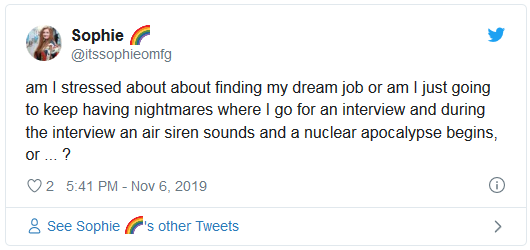
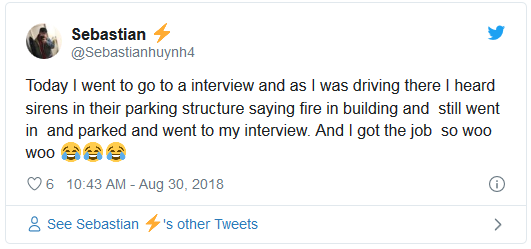
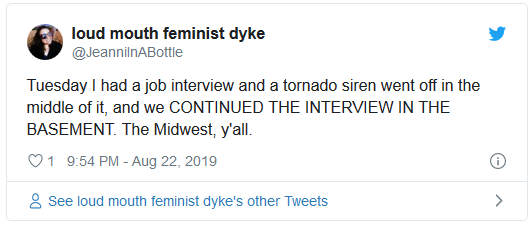
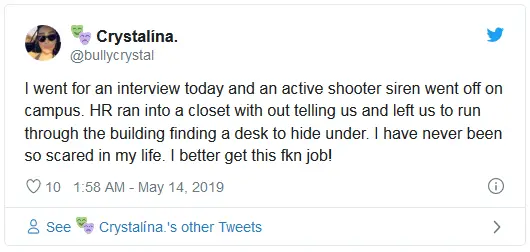
No comments:
Post a Comment